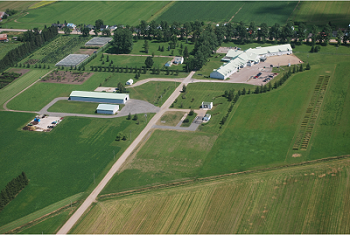
Located in a northern area, bordering on mixed and boreal forests, the Normandin Research Farm has been operated by Agriculture and Agri‑Food Canada (AAFC) since 1936. Over the decades, research conducted there has significantly helped to improve farming practices in Quebec’s Saguenay—Lac-Saint-Jean region.
Recently, AAFC and its partners gave some serious thought to the research farm’s mandate and research priorities for the years ahead. The goal was fold: to align them with the department’s scientific priorities while taking into account the aims of the region’s farm organizations and Indigenous communities.
Some 15 farm organizations were consulted to get a picture of the sector’s needs. The regional agricultural industry confirmed the instrumental role that the Normandin Research Farm plays in evaluating plant varieties and practices adapted to the northern climate and soils.
New focuses
Based on the results of this strategic thinking exercise, the Normandin Research Farm’s teams will continue their work on grains, canola, forage crops and berries, among other things, and will launch new research to provide scientific support to northern and Indigenous agricultural crops. Support for Indigenous agriculture is also a brand-new avenue of research for the research farm. By collaborating with the region’s Indigenous communities, scientists will be able to better understand their traditional knowledge, their different agricultural models and their current needs. This will help guide the research in order to improve practices and knowledge regarding crops of interest to those communities. Innovations related to the cultivation of berries and medicinal plants, for example, could contribute to food security and economic development in Indigenous communities.
The way research is conducted is also entering a new era. Whenever possible, it will be conducted in partnership with farm organizations from the region so that the Normandin Research Farm’s teams will always be well aware of the issues that producers in Saguenay—Lac-Saint-Jean are experiencing year after year.
Increased scientific capacity
A number of measures will support the new priority focuses and enhance the research farm’s scientific capacity.
- 2 new scientists will join the current teams: one researcher specializing in northern farming, and one person in charge of studies on cereal crops and oil and protein seed crops (plants rich in oils, proteins and starch, like soya, flax and canola).
- An ecological management committee for the farm was created to optimize the use of lands occupied by the research farm. Larger plots will be added to those already in use. They will allow for scientific testing in conditions similar to those found on medium-sized farms. Tests can also be conducted as part of technology showcases (technology demonstration centres). The scientific work will adhere to the principles of agroecology, a set of ecology-inspired agricultural practices.
- A portion of the research farm’s land will be converted to organic farming.
The importance of research in northern conditions
This strategic thinking demonstrated what AAFC has done to help create major scientific advances for farming in the region. As a result, several new activities will be undertaken at the Normandin Research Farm in the years to come. With renewed scientific capacities and focuses, the facility will now figure prominently in AAFC’s network of research farms dedicated to northern and Indigenous agriculture, which also includes the farms in St. John’s, Newfoundland, and Beaverlodge, Alberta.
The Normandin Research Farm is part of the Quebec Research and Development Centre. Stay tuned for more news and research projects.
Get more Agri-info
- Want more stories like this? Explore what else Agri-info has to offer.
- Interested in reporting on this story? Contact AAFC Media Relations at aafc.mediarelations-relationsmedias.aac@agr.gc.ca to arrange an interview with one of our experts.